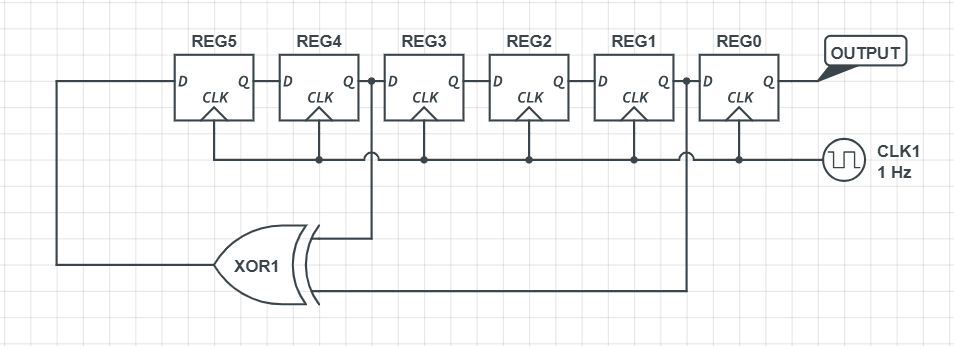WPICTF2019 - Shifty
Challenge
Type: hardware, misc, shift register
Seed: 6'b111111 Hint: {0xbc, 0x1c, 0x56, 0x06, 0xab, 0xb5, 0x61, 0xa0, 0xe2, 0x8b, 0x55, 0xed, 0x74, 0xdd, 0x2f, 0x60}
made by Ed Krawczyk.

Solution
The hint contains 16 bytes. All we had to do, is to generate 16x8 bits with the shift register, and XOR the generated bits in reverse order with the hint. So for example if the shift register gives the following output [0]: a, [1]: b, [2]: c, [3]: d7 we shall xor with the hint in d,c,b,a order.
After the XOR, we get the following string: _i_am_soo_proud_
The flag is the string without the leading and eding _ character: WPI{i_am_soo_proud}
The script that we used:
import binascii
def clk(time):
output = ""
registers = [1, 1, 1, 1, 1, 1]
for t in range(time):
newregisters = [0, 0, 0, 0, 0, 0]
newregisters[0] = registers[1]
newregisters[1] = registers[2]
newregisters[2] = registers[3]
newregisters[3] = registers[4]
newregisters[4] = registers[5]
newregisters[5] = (registers[4] + registers[1]) % 2
output += str(registers[0])
for i in range(6):
registers[i] = newregisters[i]
return output
def int2bytes(i):
hex_string = '%x' % i
n = len(hex_string)
return binascii.unhexlify(hex_string.zfill(n + (n & 1)))
hint = "10111100000111000101011000000110101010111011010101100001101000001110001010001011010101011110110101110100110111010010111101100000"
output = clk(8*16)
flag_int = int(hint, 2) ^ int(output[::-1], 2)
#print "{0:b}".format(flag_int)
print int2bytes(flag_int).decode('utf-8')
Other write-ups
writeups: